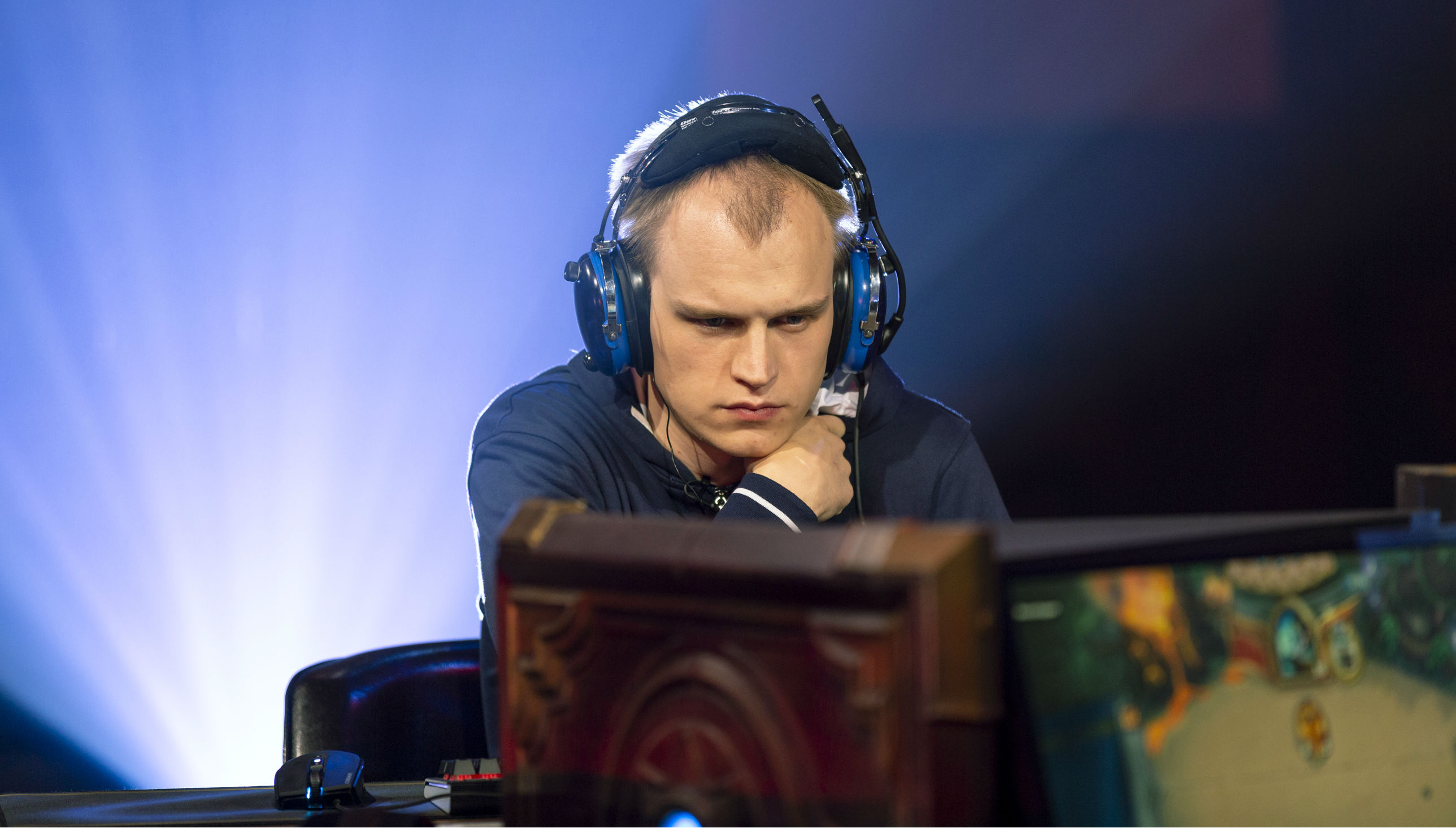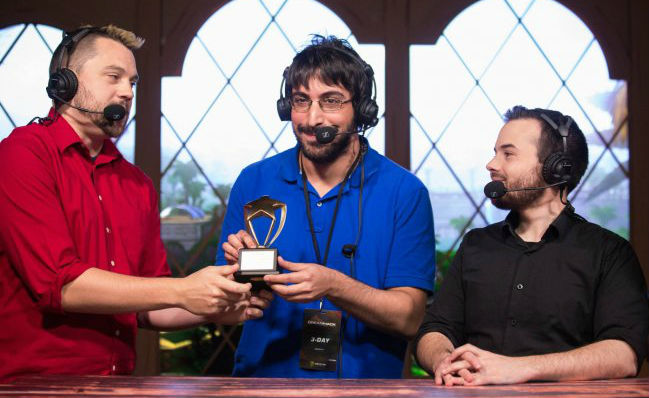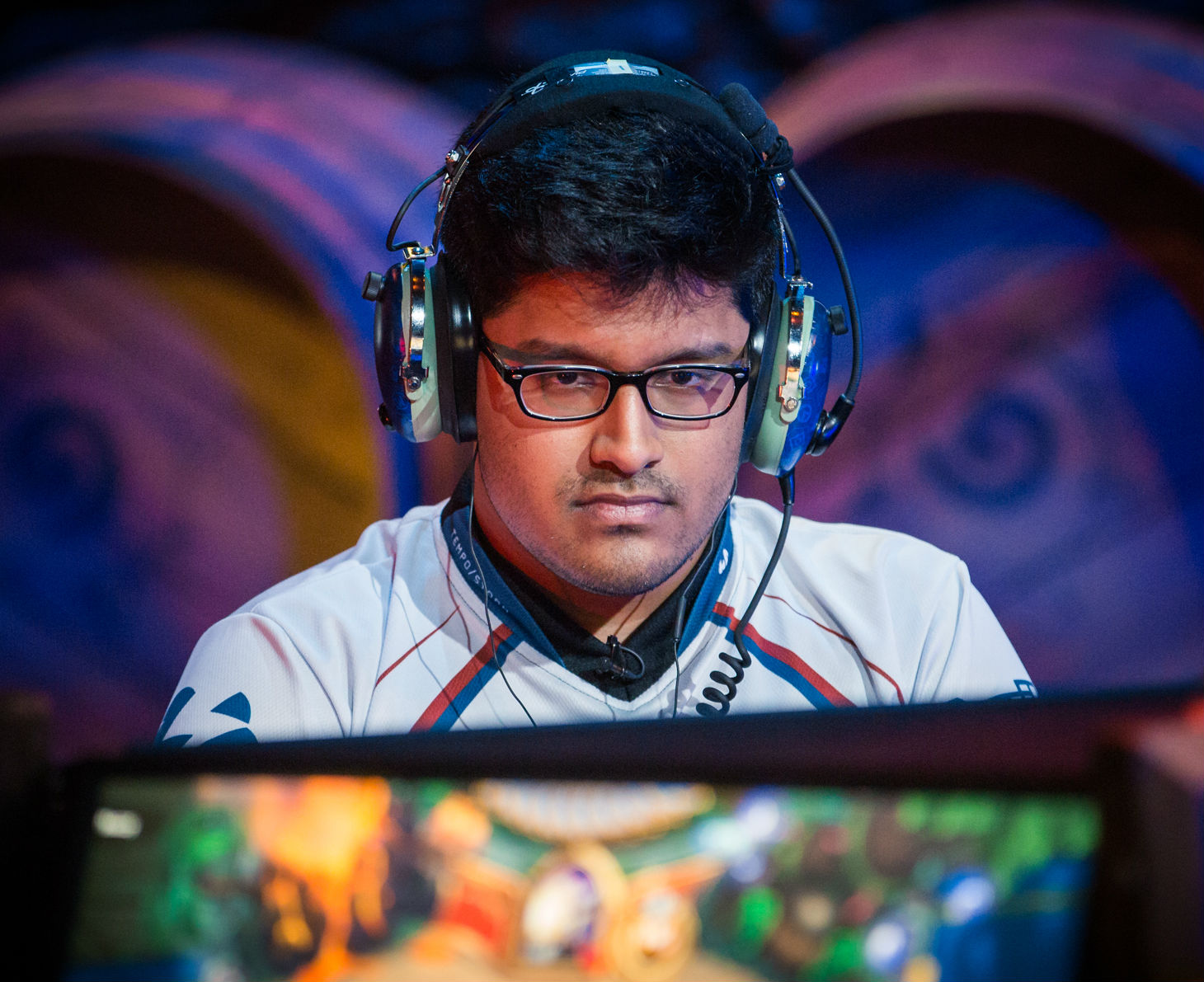Google Engineers, PhD students and child geniuses: Meet the new breed of Hearthstone pros
For all the jokes about a 'children’s card game', some very smart people are now playing Hearthstone competitively.

I do not envy Raphael "Bunnyhoppor" Peltzer, who brought one of the most brain-achingly complex lineups in Hearthstone history to last month's HCT tour stop in Germany. Piloting these decks is tough enough when you're ensconced in the safety of your bedroom, and it looks downright miserable when there's real money on the line.
Shudderwock Shaman requires a precise knowledge of the combo's cocktail; Big Spell Mage forces you to grind out victories deep into fatigue; and Miracle Rogue has been responsible for more misplays than pretty much any other decks in the game. We're living in a tournament meta where glacial control and labyrinthine combo decks rule the roost, and that only fattens the chance of a fatal oversight torpedoing your gameplan and sending you home early.
I simulate small reactions and small biological molecules in a computer," says Peltzer, from his office at the University of Oslo's Centre for Theoretical and Computational Chemistry
Not that any of that fazed Peltzer. The 26 year-old SK Gaming player played near-flawlessly on his way to the $50,000 first place prize and a guaranteed spot at the World Championship early next year. You can't underestimate that feat—grinding through stacked Hearthstone brackets is hard friggin’ work—but it's especially impressive when you consider that Peltzer is also in the final stretch of finishing up his PhD. For all the practice, and the stress, and the bad matchups, Hearthstone is still something that this champ does in his spare time.
Not just any old doctorate, either. "I simulate small reactions and small biological molecules in a computer," says Peltzer. "That's a broad description of what I do." He's speaking from his office at the University of Oslo's Centre for Theoretical and Computational Chemistry, where on average he spends eight hours a day, 40 hours a week, unlocking the quantum machinery of human chemistry, while still managing to stay on top of Hearthstone’s shifting legend meta.
"It was my second year of my PhD where I started to take Hearthstone more seriously… That's where I got super high ranks. I would spend a lot of time in the evenings, every day, playing the ladder," he says. "In the HCT tournament system, anyone can qualify based on how well they do on ladder. I thought, 'Why not give it a shot?' Not only did I qualify, but I finished top 8 [in my first competition.] I really started enjoying the scene from there on."
Peltzer ought to be an exception—burning both ends of the candle in the academic and competitive gaming fields feels like a unnecessarily stressful way of life. And yet, I can think of so many other people just like him in the professional Hearthstone coterie. Tempo Storm’s Muzahidul "Muzzy" Islam is a game dev student at Albright College, and widely regarded as the best player in America right now. Another Tempos Storm alumnus, Victor "VLPS" Lopez, recently traded in his competitive gaming career to focus on the crypto market (and seemingly already has a Lamborghini to show for it). William "Amnesiac" Barton is a high school student who's also one of the sharpest analytical minds you'll ever meet. Check him out above, cooly delivering his own TEDx talk in defense of gaming.
Even Amnesiac now seems like one of the scene’s elder statesmen compared to Casper “Hunterace” Notto. The 17 year-old Norwegian has dominated the HCT points standings in Europe for the last two seasons and already has three majors to his name, becoming the Hearthstone's first ever "Master" level player in the process.
Keep up to date with the most important stories and the best deals, as picked by the PC Gamer team.
Of course none of this is to suggest that smart people don't normally love videogames, or aren’t competing in other esports, but the number of these brainboxes competing in Hearthstone is striking. It’s also worth noting that ultra smart young people tend to be in high demand in corporate life, so it's even more surprising that so many of these players are still carving out the time required to chase the middling rewards of the card game circuit.

Esports itself is an industry that's been created and facilitated by moonlighters, and I suppose it's cool that Blizzard has built an infrastructure where the most dedicated players can succeed in spite of all of their other priorities. The most ridiculous example, at least on paper, is the life and times of David "Shoop" Steinberg, whose highest profile victory came at Dreamhack Austin last year.
I'm not surprised that STEM professionals are interested in card games—in fact, I'm surprised that more Hearthstone pros and semi-pros don't explore careers in STEM
—Shoop
He mentions a long personal history with the no-life grind; from Runescape as a kid, to World of Warcraft PvP as a high schooler, and amateur chess tournaments in college. But somehow, as an adult, he's managed to make a name for himself in Hearthstone, while also holding down an incredibly lucrative-sounding career at Google, where he works on the data quality of the company's navigation software.
At this point, he's used to the balancing act. Steinberg tells me he rations out his Hearthstone schedule by cross-referencing the number of vacation days on his docket with his current workload. He then dives into the meta looking for any specific wrinkles in combo and control decks that have been left unturned by the community at large, because while he might not have the hours to slog through scrim sessions that other players do, he can make up for that discrepancy with his deckbuilding ability. Steinberg's discipline is his best advantage.

For more coverage of Hearthstone brainiacs, check out our interview with Amensiac before he made it big, a behind-the-scenes feature on Muzzy (pictured) and his unsuccessful trip to Shanghai (he won his first major a couple of months later and hasn’t looked back since), plus a look at Dog’s ridiculously complicated ‘APM Priest’ combo. Speaking of which, these are some of the nastiest OTK combos the game has seen, and this might be the most ridiculous Grim Patron turn ever.
"The most valuable thing I've done has been setting expectations and sticking to them. If you're halfway committed to legend ladder or to tournament preparation, you get all of the stress and time commitment with none of the benefits," he says. "Right now, I know when I'm playing for fun and when I'm playing to win, and that's been a much healthier approach. It also helps that my biggest strength as a player is lineup preparation."
I ask Steinberg why he has so many peers in the Hearthstone scene that are wired like him. Why does this game, more so than other esports, bring out the academics, the computer scientists, and the molecular theorists? It's not limited to CCGs either. Go to a poker tournament and you'll be inundated with left-brain geniuses running the numbers and overbetting the river. Science is supposed to be empirical and decisive, right? So why risk a bad beat in a game full of RNG effects?
"In engineering or academia, you might be interested in a technical problem, but find that you can't solve it without filling out a grant application, or running a year-long study, or taking a couple weeks to learn the ins and outs of a new type of machine learning model," answers Steinberg. "In Hearthstone, if you want to solve interesting logical problems, all you have to do is log on. There are pros and cons to that ease of access, but I'm not at all surprised that STEM professionals are interested in card games—in fact, I'm surprised that more Hearthstone pros and semi-pros don't explore careers in STEM. I think there's a lot of untapped potential there."
Ostensibly, there will come a time when these players might not have the emotional or physical resources to commit to their Hearthstone duties, and their considerable mental abilities will permanently migrate to the things they studied in college. Until then, they stand as proof that you can both split nucleuses and count Shudderwock Battlecries on the grandest stage of them all. But if they do manage to miss lethal, just know that Twitch chat will enjoy it twice as much.

Luke Winkie is a freelance journalist and contributor to many publications, including PC Gamer, The New York Times, Gawker, Slate, and Mel Magazine. In between bouts of writing about Hearthstone, World of Warcraft and Twitch culture here on PC Gamer, Luke also publishes the newsletter On Posting. As a self-described "chronic poster," Luke has "spent hours deep-scrolling through surreptitious Likes tabs to uncover the root of intra-publication beef and broken down quote-tweet animosity like it’s Super Bowl tape." When he graduated from journalism school, he had no idea how bad it was going to get.

